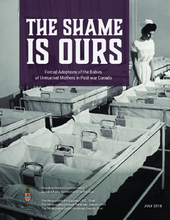Displaying 281 - 290 of 661
This report describes Canada's history of forcibly removing children from mothers, particularly unwed mothers, and placing them in adoptive families. It compares this history to the similar Australian context and offers recommendations for offering healing to mothers and children who were harmed by this practice.
This article explores the multiple reasons why adoption breakdown occurs and also serves as an introduction to the remaining articles in this special section on adoption breakdown in the journal of Research on Social Work Practice.
This article, that also serves as an introduction to the remaining articles in this special section on adoption breakdown, considers the multiple reasons why adoption breakdowns occur.
The main goals of this study from the Special Issue on Adoption Breakdown of the journal of Research on Social Work Practice were to determine the incidence of preadoption breakdown in Portugal, describe preadoptive parents’ reasons for ending placement, compare intact/disrupted placements, and identify adoption disruption risk and protective factors.
The goal of this article from the Special Issue on Adoption Breakdown of the journal of Research on Social Work Practice is to review the existing research literature on adoption breakdown.
This meta‐analytic review examines the presence and quality of close peer relationships for adoptees and individuals with foster care experience.
This article reviews developments in the Australian NSW child protection system which aim to reduce the number of children in state care.
The study from the Special Issue on Adoption Breakdown of the journal of Research on Social Work Practice investigated whether sibling relationships influenced the outcomes of a sample of adoptive placements in England and Wales that had broken down postorder or were in crisis.
This commentary from the Special Issue on Adoption Breakdown of the journal of Research on Social Work Practice highlights the authors’ conceptual and empirical contributions for understanding the incidence and dynamics of varying types of adoption breakdowns and their impact on adopted youth and their families.
This study investigated caregiver-initiated contacts to a statewide, phone-based adoption support program to understand the breadth and range of challenges families experienced during the post-adoption period.

